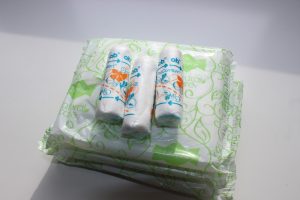Three Michigan women are going after the state’s treasury in a class-action lawsuit that seeks to bring an end to taxes on feminine hygiene products.
Three women in Michigan recently decided they’ve had enough paying taxes on certain feminine hygiene products are now suing the Michigan state treasury over what they claim is an “unlawful and invalid taxation of menstrual hygiene products.” The goal, according to the women, is to bring an end to the ‘tampon tax,’ a tax that only impacts women for the crime of being women.

The class-action suit was filed earlier this week by Emily Beggs, Clare Pfeiffer, and Wei Ho. According to them, the “sales and use taxes on menstrual products violate both the U.S. and Michigan constitutions and discriminate on the basis of sex.” The suit states:
“Michigan collects approximately $6.9 million annually in taxes on menstrual products. While this amounts to less than 0.01% of total state revenue, the (”tampon tax”) represents a significant financial burden on women: Above and beyond the estimated $114 million Michigan women must pay each year for medical necessities such as tampons, pads, and liners, they are forced to pay an additional $6.9 million in sales and use taxes to the state.”
The plaintiffs are supported by Period Equity, a nonprofit organization, and argue that because menstrual hygiene products are medical necessities, it is “unlawful to tax them, particularly because women who menstruate don’t do so by choice.” At the moment, the state has a 0.06% sales tax on a variety of goods, including menstrual products. The plaintiffs claim that “in contrast, other products also used by men that are considered necessities — such as food items and prescription drugs — remain untaxed in the state.” The complaint argues, “The State cannot make sex a determining factor in the application of Michigan’s sales and use taxes. In administering and enforcing the (”tampon tax”), the (state Treasury) maintains a tax on women.”
The plaintiffs felt inspired to file their suit after “the federal government declared menstrual care products as qualified medical expenses under the Coronavirus Aid, Relief and Economic Security (CARES) Act.” As part of the suit, Ho, Pfeiffer, and Beggs are asking the state treasury to “issue a refund of all sale and use taxes on menstrual hygiene products collected over the last four years from them and similarly situated persons who have paid sales and/or use taxes on their purchase and/or consumption of menstrual products in Michigan.” Altogether, the plaintiffs said they are “entitled to a refund of around $130, plus interest, for sales and/or use taxes paid on menstrual products over the last four years.” Additionally, they further claim that the class of similarly situated persons, which is estimated to be about 2,400,000 people, are “entitled to a refund of about $27.6 million, plus interest, for sales and/or use taxes paid on menstrual products over the last four years.”
In addition to the refund, the plaintiffs want the court to declare the enforcement of sales and use taxes of menstrual products as “unlawful, invalid, and unenforceable.” On top of that, they want the court to declare the taxation violates the “U.S. and Michigan constitutions’ equal protection clauses.” The suit states:
“Women in Michigan who buy and/or consume menstrual products in Michigan are harmed by the Defendants’ taxation of these products because they are forced to pay a sales and or use tax on products necessary and vital to their health, while men who purchase products far less or equally necessary to their health are not.”
Sources:
Michigan women seek $27M refund from state in ‘tampon tax’ lawsuit
S.3548 – CARES Act
Beggs v. Michigan


Join the conversation!